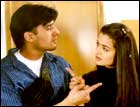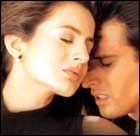Loose impact!
Pratiksha Arora
Yeh Zindagi Ka Safar is a tease of a film. 
You wait till the end for Amisha Patel to stand up for her rights in this woman-centric film. But at every step, this protagonist is shown leaning on the shoulders of a man.
Tanuja Chandra known for her hard-hitting films disappoints with this half-baked affair. The script is neither an intense drama like Sangharsh, nor can it manage to make a statement like Dushman.
Instead it is yet another commercial potboiler, with the usual songs, comedy, action, revenge and the subtle love angle thrown in.
The notes of the title song – Kaun hoon main – begin the movie on a dramatic pitch.
The first few scenes with clichéd dialogues etch the character of Sarena (Amisha Patel), a pop star on the verge of superstardom.
Unfortunately, before her superstardom (justified by a handful of people clapping in an empty music shop) is amply displayed, she is slandered by a newspaper story about her being an adopted child.
Her enraged father, industrialist Vivek Dewan (Gulshan Grover) sues the errant journalist -- Jai Bhardwaj (Jimmy Shergill), the opportunist editor of Adarsh Times. However, despite her father's attempts to suppress it, Sarena manages to find out the truth.
In search of her own identity and her mother to find the reasons behind her abandonment, Sarena finds Jai at every stage of her journey, as the companion in her mission.
But Jai’s motives are far from noble. Underlined by his selfish dreams of owning an office in Nariman Point and save his nearly bankrupt newspaper, he is out to grab another story.
The first half fast-forwards in a jiffy as Sarena finds her mother, Sister Namrata (Nafisa Ali).
Chandra falls back on her usual mode of using songs to underline emotional situations where silence could have heightened the effect or a wordy emotional scene would have made a better impact.
The realisation of the mother-daughter bond treads on similar lines.
Post-interval, the story, which till now had been running towards a fast-paced climax, slows down to a jog of the usual revelations.
Sarena finds out that she is not a child born out of love, but of rape. Jai finds out that beneath his shrewd, street-smart veneer lies a reporter with a conscience. Sister Namrata finds strength and courage within herself to acknowledge her child and take her rapist to court.
The end of this film is predictable. However it leaves you unsatisfied with a lot of unanswered questions and unfinished thoughts. 
Like, how quickly the assumption that Sister Namrata is Sarena’s mother is established or why did the Police Commissioner himself have to try and kill Sister Namrata when he could have had any of his henchmen do the same.
The script too disappoints. In an attempt to convert this interesting subject into a viable commercial venture at the box office, Tanuja barely skims the surface.
Deftly handled though are the scenes establishing the chemistry and bond between the father and daughter.
Gulshan Grover excels in scenes when he depicts the insecurity of a father whose adopted child wants to look for her real parents.
Amisha Patel, the main protagonist in the film, is good in parts. Saddled with a script that requires her to either cry, scream or shout, the actress expresses anger through dramatic overtones and stiff body language.
Unfortunately, her anger remains at the same feverish pitch throughout the film, punctuated with a lot of screaming and screechy dialogue delivery, which sometimes makes her character sound fake and cardboardish.
However there are believable moments, like the confrontation scene with her father in the press or moments with Jimmy Shergill, where Amisha's untapped potential as an actress shines through.
Ms Patel though needs to do a rethink about her costumes. Rocky S overdoes the understated blacks, browns, blues and the grays, that don’t gel with her character of a flamboyant pop star.
Jimmy Shergill as the slimy-journalist transformed into a do-gooder is a perfect foil to the hysterics of Amisha.
Restrained in his dialogue delivery and in echoing his homegrown honesty and desi wit, this actor exudes sheer screen presence. Also, the actor effectively uses his mannerisms and casual body language to lend an understated chemistry to this melodramatic affair.
His emotional scenes are delivered with the right touch of angst. Notable amongst which is the short scene that details his transformation in a conversation with Kunwaare Hulaysi Shukla (Rajpal Yadav delivering yet another funny performance).
Nafisa Ali as the mother manages a better performance after the one in Major Saab. Consistent in her performance, she plays her part competently. Ehsaan Khan as the rapist conveys the menace and a blurred sense of righteousness with ease.
Considering that Amisha is the popstar, it is Jimmy Shergill who ends up crooning up more melodies.
The title track, Woh kaun thi rendered by a shrieking Jaspinder Narula is played umpteen times in the background throughout the movie and grates on your nerves.
The softer numbers — Ahistaa, ahistaa, Aye chand khoobsurat, and Zamane mein gam are pleasing and aid the narrative of the film.
The cinematography is strictly okay. The dubbing left a lot to be desired as a lot of people questioned whether someone had dubbed for Amisha.
The Mahesh Bhatt touch is evident—especially in the locations. The bus and the conductor return, along with the typical charpoi, drink and song scene that is a take off from Dil Hai Ki Maanta Nahin.
Yeh Zindagi Ka Safar may or may not do well at the turnstiles. Watch it strictly if you are a Tanuja Chandra fan or have nothing better to do this Diwali.
Rediff Guide to Yeh Zindagi Ka Safar